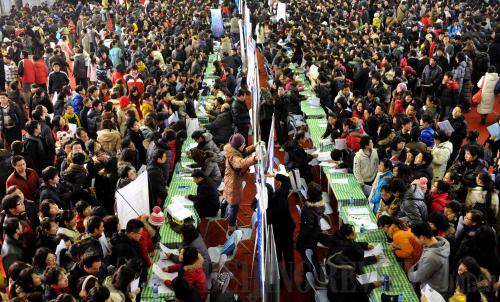|
 |
|
LOOKING FOR THE FUTURE: A job fair at Tianjin University of Science and Technology attracts thousands of college graduates on January 3 (LIU HAIFENG) |
For centuries, Chinese people have believed that "knowledge can change fate." A better education has been seen as the key to a brighter future and children in rural areas, particularly remote areas, struggle to get into college in order to improve their prospects and the livelihoods of their families.
"Getting admitted to a good university in a major city represents not only a personal achievement for rural students, but also a major change for their families," said Xiong. "It is the most direct and effective way for them, sometimes even the only way, to shake off poverty."
For several decades, rural students were a key part of the intake of major universities. They were viewed by professors and admissions staff as more focused and hard working compared to their urban counterparts.
But today this avenue of social advancement is in danger of being sealed off.
"It's become even harder for us rural students to get into top universities," Zhao said, adding that he was lucky to be an exception to the rule.
Recently a teacher with 15 years of teaching experience posted an article online saying that young people from poor rural families are bound to struggle to reach the top of society as they effectively start their lives as losers. The post sparked a new round of discussion and debate on the inequality of education and the uneven distribution of social resources.
Unequal resources
Zhou Xufeng, Director of the Admissions Office of China Agricultural University, suggests the hukou (registered permanent residence) system is responsible for the imbalanced intake.
"The search for better schools drives many rural residents into cities and changes their hukou status. Students originally from rural areas now hold urban hukou," Zhou said.
Therefore the decline may not mean that fewer students with rural origins are entering universities but rather reflects the fact that bright rural students often hold urban hukou by the time they enroll in universities.
"In terms of China Agricultural University, another problem is that students from rural areas are reluctant to take jobs related to agriculture, for many of them, college is a way to get out of the rural areas," Zhou said.
However, Xiong attributes the decrease of rural students at leading universities to the unequal distribution of educational resources.
"Educational equality is the foundation for providing opportunities for rural children in underdeveloped areas. Equality means an equal starting line, an equal process and fundamentally a fair chance to succeed," he said.
According to official statistics, less than 40 percent of rural children are receiving a preschool education.
Meanwhile, there exists another daunting challenge. For decades educational resources have been unfairly allocated between urban and rural areas.
"Urban areas have better teachers and resources. Schools in rural areas, on the other hand, are fraught with the outflow of talent, and a shortage of teachers and resources," Xiong said.
A 2009 survey of students and teachers in six counties in underdeveloped northwestern Gansu and Guizhou provinces and Ningxia Hui Autonomous Region showed that poor living and teaching conditions result in a dearth of quality teachers and good students. Talented teachers and students try their best to reach county or even higher level schools where conditions are much better.
"Some rural teachers are simply not qualified as they received college degrees from continuing-education programs, which do not really provide a good education," Xiong said.
To correct this, the Ministry of Education has launched a series of special recruitment plans to attract qualified teachers to rural areas.
One of the government's major initiatives has placed more than 180,000 teachers in 18,000 rural schools around the country since 2006. Teachers involved in the program for three years will be able to study for a Master's Degree in Education without having to take an entrance exam.
But many of these teachers admit they will still leave the countryside after their three-year term ends. A yawning gap will remain between the number of quality teachers in rural and urban areas.
"With only a handful of able teachers in the provinces it is almost impossible for students in villages to compete with their urban counterparts," Xiong said.
The fact that the majority of China's most prestigious universities are located in big cities like Beijing and Shanghai is another advantage for urban students. Some schools now have policies favoring students from their own cities, in order to support the local government and economy.
A slew of policies, including lower entrance scores and bonus scores for special talent in arts or sports, have added to the discrimination faced by rural students, who have little or no access to extra-curricular activities.
Schools in big cities on the other hand have access to the best teachers and facilities. Students at these schools can choose from a range of subjects and stand a much better chance of being admitted to prestigious universities.
| 